According to reports from inmates later confirmed by medical experts, La told detention staff he was withdrawing and requested medical care, but his symptoms, including persistent vomiting, were left untreated, resulting in his death. Drug withdrawal is a predictable physiological response when a person who is chronically dependent on a substance is abruptly cut off, often involving severe nausea, vomiting, dehydration, physical pain and panic, cardiovascular strain, and escalating medical instability. Substance dependence is a chronic medical condition, no different in principle from other conditions that carry known risks when left unmanaged, such as diabetes, heart disease, or epilepsy. When symptoms of chronic conditions go untreated, particularly in custodial settings where people are confined, closely monitored, and unable to seek care on their own, the resulting harm is entirely foreseeable. Rather than explaining why someone reporting severe withdrawal symptoms was left without basic medical care in government custody, the official death notice on ICE’s website devotes significant space to detailing La’s past criminal history.
This lack of accountability is not surprising given the decades long history of preventable deaths in ICE. A Human Rights Watch analysis of 18 ICE detainee deaths between 2012 and 2015 found that independent medical experts concluded substandard medical care likely contributed to at least 7 of those deaths, with evidence of dangerous medical practices present in 16 of them. In several cases, detainees repeatedly reported severe symptoms only to be dismissed or accused of exaggeration, with hours-long delays before staff intervened. One man was found unresponsive in a pool of bloody vomit after officers failed to enter his cell for minutes, and emergency responders were not called until it was too late. A peer-reviewed analysis of 55 deaths in ICE custody between 2011 and 2018 found that nearly all involved serious medical failures, including delays in care in 95% of cases, poor care delivery in 95%, missed or ignored red flags in 80%, and failures in emergency response in 82% of deaths.
These repeated failures point to a detention system with limited transparency and little independent medical oversight.
More recent findings reinforce these earlier conclusions. A 2024 joint investigation by the American Civil Liberties Union, Physicians for Human Rights, and American Oversight examined 52 deaths in ICE custody from 2017-2021 and found that 95% were preventable or possibly preventable with appropriate medical care. Medical experts identified recurring failures across cases, including misdiagnosis, delayed or denied treatment, interrupted medications, and inadequate emergency responses, with people living with chronic health conditions disproportionately affected. Yet ICE continues to rely largely on internal death reviews, limiting transparency and meaningful corrective action and allowing the same preventable failures to recur.
What makes this lack of accountability even more disturbing is that the agency has recently halted payments to the third-party medical contractors responsible for providing care to people in custody. Reporting indicates that ICE stopped paying outside medical providers in October 2025, with claims processing not expected to resume until at least April 2026, even as the detained population has grown to more than 73,000 people nationwide. Because ICE relies heavily on these providers for specialty and off-site care, the payment freeze has already led some clinicians to stop treating detainees altogether and others to delay or deny essential services, including medications and treatment for chronic conditions. For people held in civil detention, this decision further erodes the already slim access to basic medical care inside facilities.
These repeated failures point to a detention system with limited transparency and little independent medical oversight. ICE detention facilities operate largely out of public view and are structured through layers of bureaucracy and private contracting that disperse responsibility across agencies and vendors. Medical care is often delivered by outside contractors, oversight is primarily internal, and meaningful external review is rare. In this environment, gaps in care are difficult to trace, accountability is easily diluted, and preventable deaths are allowed to recur without clear consequences.
When the government confines a person, whether in a prison, jail, or immigration detention facility, it assumes full control over that individual’s ability to access medical care. People in detention cannot seek emergency treatment on their own, choose their providers, refill prescriptions independently, or remove themselves from unsafe conditions. Their health and survival depend entirely on the state. Providing timely and adequate medical care in custody is therefore a baseline obligation that must be followed.




